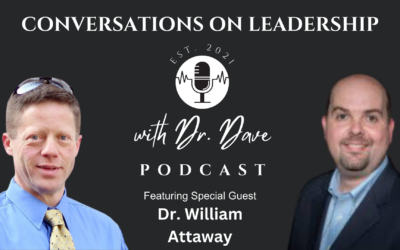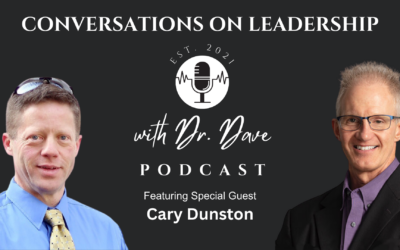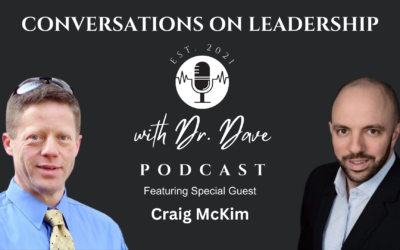Transcript
Dr. Dave Miles: Welcome to “Conversations on Leadership with Dr. Dave.” Today we have a special guest, Al Robinette. Al, welcome to the show. Please introduce yourself to our listeners and give us a little bit of your background.
Al Robinette: Hey Dave, good to see you again and thanks for having me on. I host a radio show here on KLDR called “That’s What I Read.” My background is in Industrial-Organizational Psychology and Behavioral Science Consulting in the private security industry. I work with organizations and subject matter experts to design and develop the best talent strategies for the private security sector, including roles like executive protection and security details. It’s a really cool field of work, and we have a lot of fun doing it.
Dr. Dave Miles: It’s interesting because I always heard there are three types of problems businesses typically have: people problems, process problems, or profit problems. It sounds like we both drew the short end of the stick and got the people problem end of it, but there’s no shortage of business there.
Al Robinette: Absolutely, Dave. The people element is something I’m very passionate about. Every organization, whether small or large, faces challenges around their talent. How do we pick and select the best talent, train and develop them, onboard them effectively, and keep them happy to improve retention? It’s a universal strategy every organization needs, but unfortunately, many don’t have a talent strategy in place. They might have strategies for business models, marketing, or 401(k) programs, but not for their talent. That’s where we come in to help put that together because you can’t reach your goals without the right talent.
Dr. Dave Miles: Nowadays, with the hiring environment, it’s not like you can just be a difficult manager and expect to replace people easily. There aren’t 50 people waiting in line to take the job anymore. Retention is huge, and it doesn’t take much to draw away disengaged employees, whereas highly engaged employees require significant offers to leave.
Al Robinette: Exactly. The great resignation showed us that it has become an employee’s world. Organizations with high turnover are struggling even more now. Studies and research, like the one Facebook did a few years ago, show that people leave not just because of bad bosses or money but because they aren’t getting opportunities to develop and grow. They want to feel valued and use their skill sets. When organizations fail to provide this, employees seek it elsewhere.
Dr. Dave Miles: Gallup’s research found that 70% of the variance in team engagement is explained by the quality of the manager. This shows how crucial leadership is. In 2021, they also found that the great resignation wasn’t an industry issue, but a workplace culture issue. The loss of productivity from disengaged employees can cost organizations significantly, and replacing workers can be expensive.
Al Robinette: Absolutely. There’s a significant cost associated with turnover. Organizations that don’t have strategies in place to retain their talent are seeing higher turnover and struggling more. Good leadership and a supportive culture can make a huge difference in retention and overall productivity.
Dr. Dave Miles: Speaking of leadership, what does leadership mean to you, and what does good leadership look like?
Al Robinette: Leadership is about being a good steward for your team. It means being approachable, building trust, and creating a psychologically safe space where team members can share their concerns and ideas. Good leaders support their team, remove obstacles, and help them become the best versions of themselves. It’s not about the leader’s ego or goals but about promoting and supporting the team.
Dr. Dave Miles: That aligns with what Simon Sinek says about leadership being a responsibility to care for others. It’s about empathy and humility, which many leaders struggle with. Admitting you don’t know something and working together to find the answer can build a stronger bond with the team.
Al Robinette: Exactly. Leaders who pretend to know it all create animosity and a toxic culture. Being humble and open to feedback builds trust and loyalty. A good exercise I did early in my career was to leave the room during a team meeting and let them write down what they liked and didn’t like about my leadership. It was humbling and eye-opening, but it helped me improve and build a better relationship with my team.
Dr. Dave Miles: That sounds like a fantastic exercise, though it must be tough to stay calm and not get defensive. Transitioning from that, what is one of the biggest leadership challenges you’ve faced in your career?
Al Robinette: Early in my career, I was promoted too soon to a district-level position overseeing multiple locations. I was very aggressive and results-focused, treating people as commodities. I had mentors who helped me realize the importance of leading a team, not as a single person but as part of a collective effort. It was a pivotal moment that helped me understand the impact of my actions on others and the importance of supporting and developing my team.
Dr. Dave Miles: That’s a powerful lesson. What do you think is one of the biggest mistakes leaders make today?
Al Robinette: One of the biggest mistakes is not being open to diverse perspectives and ideas. Leaders often have a silo mentality and don’t value the input from their team. Another mistake is a lack of humility and emotional intelligence. Understanding oneself and others on a deeper level is crucial. Emotional intelligence helps leaders connect with their team, motivate them, and create a psychologically safe environment.
Dr. Dave Miles: Empathy and connection are crucial for effective leadership. How can leaders improve their leadership skills?
Al Robinette: The first step is self-awareness and acknowledging the need to improve. Understanding oneself, including motivations and communication styles, is essential. Working with a coach or trusted advisor can provide real-time feedback and help develop these skills. Emotional intelligence is also vital. It’s about understanding and managing your emotions and those of others. Leaders need to be open to feedback, humble, and willing to learn and adapt.
Dr. Dave Miles: It’s about connecting with people and understanding their motivations and behaviors. What are some practical steps leaders can take to develop these skills?
Al Robinette: Using behavioral tools to understand yourself and your team better is a good start. Creating a psychologically safe space where team members feel comfortable sharing their thoughts and ideas is crucial. Recognizing and valuing different perspectives and motivations can prevent conflict and improve team dynamics. Leaders should also focus on continuous learning and development, seeking feedback, and being open to new ideas and approaches.
Dr. Dave Miles: Those are excellent points. How can our listeners connect with you?
Al Robinette: The best way to connect with me is on LinkedIn. You can find me by searching for Al Robinette. I love connecting with people from different industries and building relationships. Each connection brings new perspectives and insights that help me grow and think differently.
Dr. Dave Miles: Thank you, Al, for joining us today and sharing your insights. It’s been a pleasure having you on the show. And to our listeners, we will see you next time on “Conversations on Leadership with Dr. Dave.”
This week on Conversations on Leadership with Dr. Dave we have special guest, Al Robinette.
Al is an Industrial & Organizational Psychology Practitioner, HR Consultant, and Leadership Trainer with Career Path Consulting & Development, LLC (https://careerpathcd.com/).
Al is completing the doctoral requirements for a Ph.D. in Industrial & Organizational Psychology, the study, and science of working environments and issues facing individuals, teams, and organizations.
He has a long history in the security, executive protection, and loss prevention industry with both work and consulting experience.
Al has also been a radio show host with his show “That’s what I heard” on KLDR radio.
You’ll enjoy this interview with Al and find it insightful.
Please reach out and connect with Al on LinkedIn (https://www.linkedin.com/in/alrobinette/).
Let us know in the comments what stood out to you! www.Linktr.ee/DrDaveMiles



